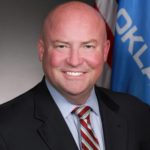By Oklahoma Institute for Child Advocacy CEO Joe Dorman
The Oklahoma Institute for Child Advocacy (OICA) is a statewide nonprofit charged with “creating awareness, taking action, and supporting policy to improve the health, safety, and well-being of Oklahoma’s children.”
An integral part of our work is to provide information to policymakers at all levels of government, from local to federal. We also share this research with those who will reach out to officials themselves, sharing their concerns regarding policy decisions under consideration. Solid data enhances life stories shared by citizens, making the stories more persuasive for policymakers.
From my days as a state lawmaker, when my office received just a few calls about an issue from the people in my legislative district, I knew something serious was happening.
The budget changes happening with the federal government will certainly have an impact on our state. OICA receives funding through a federal grant to help Oklahomans navigate the complex system of signing up for children’s health insurance through Medicaid, which the state calls SoonerCare. It is still unclear whether we will continue to receive funding due to the recent federal restrictions on many programs; the money is provided through the Centers for Medicare and Medicaid Services (CMS).
In Oklahoma, there are 552,090 children as of December who are signed up for SoonerCare. The grant is important because an estimated 7% of children in Oklahoma qualify for this healthcare but are not enrolled by their families. Children qualifying for SoonerCare under the federal CHIP program are under age 19 and have a family or individual income between the maximum for standard eligibility and the expanded Federal Poverty Level income guidelines. From that, you can see how many families might simply not know if they qualify.
For a family of one, which could be an independent minor, the income threshold in which to qualify is $31,632. For a family of two, the level is $42,948; for three, $54,240; and the numbers continue up based upon family size.
Our work with this grant assists those seeking help to enroll for this temporary program until their economic situation can improve. As many Oklahomans can attest, it only takes one medical emergency for a family to end up in bankruptcy, further forcing families into other assistance programs through government or charitable support.
This grant work helps get those who qualify on insurance to avoid such a catastrophe. If you would like to see if you qualify, call 1 (833) 465-7526 to visit with a navigator.
For SoonerCare, federal funding covers a significant portion with a match of nearly 90%. If this program’s federal budget is cut, this will either pass the burden back to the states or the states will be forced to reduce eligibility numbers, meaning fewer people will have healthcare.
Our state budget split has about 47% coming from federal funding. Only a fraction of state overall spending is actually allocated by the Oklahoma Legislature; most federal dollars are provided as a match based upon what the state spends, while some other dollars are predetermined spending as required by law.
Now, add on to this that the state expects to receive less revenue from state taxes for the upcoming fiscal year, primarily due to the state grocery tax cut passed last year. Some at the State Capitol are discussing further tax cuts.
We agree that budgets must be audited and some even streamlined, but blanket cuts will harm Oklahoma’s children.
If you would like to share your thoughts with our federal delegation, this link – https://oklahoma.gov/mcgirt/contact-congress.html – provides their office information. One call could make the difference on whether cuts are made, and how this will impact decisions made by our own state lawmakers.


